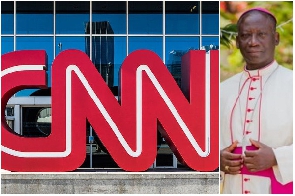 The Catholic Bishops have refuted claims the CNN contacted them
The Catholic Bishops have refuted claims the CNN contacted them
The President of the Ghana Catholic Bishops Conference, Bishop Matthew Gyamfi, has refuted contents of an investigative piece conducted by the CNN.
According to them, the international media outlet did not reach out to them on the issue contrary to what was suggested in its report.
In the report, the American channel stated, among other things, that some Ghanaian churches received foreign aid and funding from donor United States, United Kingdom and European donors who support Lesbian, Gay, Bisexual, Transgender, Queer and Intersex (LGBTQ+) activities.
These churches, according to the report, despite their strong support for the anti-LGBTQ+ Bill in parliament, benefitted from funding from intergovernmental organisations that support LGBTQ rights and activities for developmental purposes.
CNN’s findings cited Churches and Christian institutions, including the Christian Council of Ghana (CCG), Evangelical Presbyterian Church (CCG member), Methodist Church (CCG member), Presbyterian Church (CCG member), and the Catholic Church, as having received not less than $5.1 million of monies from donors for development projects by or for the church.
The CNN also stated that before it aired its report, it had contacted the churches but failed to get any responses from them.
But in a response, Bishop Matthew Gyamfi, President of the Ghana Catholic Bishops Conference told GhanaWeb in a phone interview that they had not been contacted on any such thing.
“I was not contacted; we were not contacted,” he stated.
He also explained that the stance of the church has remained as it is: it is not in support of LGBTQ+ rights.
He added that if the donations they receive from such countries, as stated in the CNN reported, were with the assumption that they (the churches) would support campaigns for same sex rights, then they need to revisit their notes.
“We will not accept any monies from LGBTQ or those who are proposing those things, or we accept it to promote their views, no. we have our views, we have our stance on certain issues and you can’t buy it.
“If they gave it on the assumption that they can change the church’s stance on LGBTQ, then they were making a very big mistake and they should have done their work very well. But I don’t think LGBTQ group anywhere has given anything to any church in Ghana; I don’t know, but certainly not the Catholic Church,” he said.
Find below the breakdown of the donations to the various churches cited by the report:

Import of the report?
The report, through its findings, sought to suggest that these churches in Ghana still benefitted from millions in Western aid despite having campaigned and strictly stated their stance against LGBTQ+ activities in Ghana.
CNN spoke to some foreign organisations who clearly stated their displeasure about the fact that donor countries who have widely indicated their support for human rights, gender diversity and sexual rights of members of the LGBTQ+ community are still making room to donate to churches and organisations in countries like Ghana who are against the same course.
Some leaders of these organisations who spoke to CNN said these as captured below:
"It's like stating you're going to go green and then funding the petrol industry," said Neil Datta, executive director of the European Parliamentary Forum on Sexual and Reproductive Rights. Donor agencies need to be "more aware that sexual and reproductive rights are contested issues", and make sure that "they are not inadvertently funding the organizations who are working against some of their other objectives," he said, calling for stricter "background checks" on potential grantees.
"This reveals inconsistencies in the funding practices of major donors and implicates them as complicit in fostering homophobia and transphobia in Ghana," said Caroline Koussaiman, executive director of the Initiative Sankofa d'Afrique de l'Ouest (ISDAO), an activist-led fund supporting gender diversity and sexual rights in West Africa. "This is the antithesis of "do no harm" principles."
"We need donors to support our struggles for liberation, and not directly or indirectly fund anti-gender movements which we know are extremely well resourced," she added.
Foreign donations suggest fostering homophobia or transphobia?
CNN in its report also spoke to some of these foreign donors to enquire how that monies were still being sent to churches in countries that were homophobic.
This was despite its indication that these foreign donations cannot be said to be used for funding anti-LGBTQ activities but generally for developmental purposes.
“There is no indication the funding identified went to any explicitly anti-LGBTQI+ activities,” the CNN report said.
While some of these donors indicated that support had been stopped in that regard, some others said the funding was done under now-outdated guidelines.
Italy's Ministry of Foreign Affairs and International Cooperation for instance, told CNN it "is not responsible for the use of these [identified] funds," saying they go directly from people's taxes to different religious organizations that distribute the money for development work.
Ghana and the LGBTQ+ Bill:
Ghana is currently working on a proposed bill - Promotion of Proper Human Sexual Rights and Ghanaian Family Values Bill proposed to introduce restrictions on LGBT+ activities in the country.
The Bill was proposed by some 8 Members of Parliament - Sam Nartey George, Della Sowah, Emmanuel Kwasi Bedzrah, Alhassan Suhuyini, Rita Naa Odoley Sowah, Helen Ntoso, Rockson-Nelson Dafeamekpor, John Ntim Fordjour in June 2021.
On 2 August 2021, the bill passed its first reading in the Ghanaian Parliament, being referred to the Committee on Constitutional, Legal and Parliamentary Affairs for assessment.
AE/WA